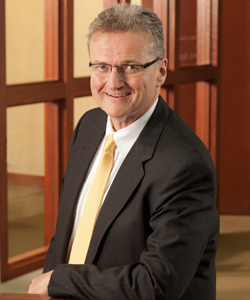
Jim Brennan
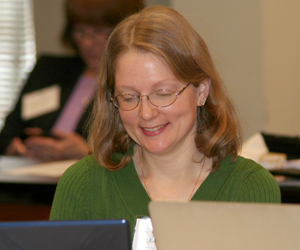
Gov. Jill Kastner, Milwaukee,
represents the Young Lawyers Division on the board.
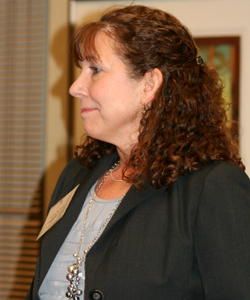
New governor, Teresa Kobelt, Middleton, is
welcomed to the board. Kobelt will complete
Frank Remington’s term, who is now a Dane County Circuit Court
judge.

Gov. Fred Kaftan, West Bend, responds to a
question regarding State Bar elections.
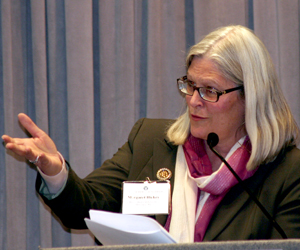
Gov. Margaret Hickey, Milwaukee, Finance
Committee chair, gives an overview of the State Bar's finances to
the board.
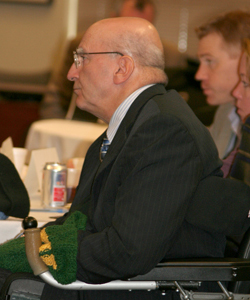
Gov. Steve Levine, Madison, discusses his
proposal to add candidate information to election ballots at
today’s board meeting.
Visit the State
Bar’s Facebook page for more pictures from today’s
meeting, or click
here.
Feb. 10, 2012 – State Bar of Wisconsin President Jim Brennan
welcomes a review of the State Bar’s performance, but says such a
review is costly and unnecessary. At the Board of Governors’
meeting today in Madison, the board unanimously agreed that a review is
not warranted.
The vote signals opposition to the Wisconsin Supreme Court’s recent
6-1 vote to consider the possibility of creating a commission to
review, at an estimated cost of about $82,000, the performance of the
State Bar in carrying out its public function.
The supreme court may, when it deems advisable, order a performance
review under Supreme Court Rule 10.10.
The last performance review took place in the early 1980s.
In the years since the last review, the State Bar has created and
strengthened programs and initiatives to assist lawyers and the public,
Brennan says. In other words, Brennan says a performance review would
only reveal positive data. For instance, it added the Wisconsin Lawyers
Assistance Program, the Law Office Management Program, and added a
full-time pro bono coordinator to help low-income individuals connect
with legal resources.
“The State Bar is performing the purposes for which it is
organized, and therefore, an audit under SCR 10.10 is unnecessary.
Moreover, it’s a waste of our members’ money,” Brennan
said, adding that the State Bar is performing its functions better now
than 5-10-15 years ago.
The supreme court’s consideration of a SCR 10.10 review stems from a pending petition
asking for a voluntary bar, submitted by State Bar Governor members
Steven Levine and James Thiel. But even Levine
and Thiel think a SCR 10.10 review is not
warranted at this time.
“I want to make very clear, the petition to the supreme court
requesting a voluntary bar did not in any way ask for a 10.10
review,” Levine told the board.
The board will designate a representative to communicate its
opposition to a SCR 10.10 review to the Wisconsin Supreme
Court, and its reasons for taking such action.
Task force on new lawyers announced
At the board meeting, State Bar President Jim Brennan announced the
formation of a task force to address the needs and challenges of new
lawyers.
Brennan first
addressed the new task force in the February 2012 Wisconsin
Lawyer, naming attorneys Art Harrington and Sherry Coley as co-chairs. “I charge a task
force to examine the array of professional challenges facing our young
lawyers, as well as their training and mentoring needs, and develop an
action plan for the State Bar’s response,” Brennan
wrote.
Brennan asked board members to be mindful of the challenges new
lawyers face, such as rising student loan debt, and help the task force
in its effort to develop an action plan to assist new lawyers as they
transition from law school to practice.
Board sets Keller
dues reduction amount for FY 2013
The Board adopted a Keller dues reduction amount of $8.41 for
fiscal year 2013 (July 1, 2012 to June 30, 2013). That amount is up from
a FY 2012 reduction of $5.
Under Keller v. California, 382 U.S. 43 (1965), the State Bar
may not use the mandatory dues of any member who objects to activities
that are not reasonably intended for the purpose of regulating the legal
profession or improving the quality of legal services.
State Bar sections cannot take concurrent policy
positions
The board clarified that State Bar sections cannot take policy
positions or lobby on issues if the State Bar, as a whole, as taken a
position on the same issue.
That interpretation of existing policy and rules does not prohibit
sections from assisting State Bar leadership in lobbying on issues in
which it holds a particular expertise. The official interpretation, as
adopted by the board, reads:
“Public policy positions taken by the Board of Governors on
behalf of the State Bar of Wisconsin are exclusive of any section
positions. Therefore, while sections are encouraged to assist State Bar
of Wisconsin leadership in lobbying on issues in which it holds a
particular expertise, sections may not take concurrent positions in
which there already exists a State Bar of Wisconsin position.”
Board defines “core” principles to assist lobbying
efforts
On recommendation of the board’s Policy Committee, the board
adopted a definition of “core” principles to assist State
Bar staff and leadership when addressing pending legislation.
The “core” principles that will guide the State
Bar’s legislative priorities relate only “to the regulation
of the legal profession or improving the quality of legal
services,” the board clarified.
In addition, last June the board approved a directive that the State
Bar’s Executive Committee may act on “core”
legislation during periods when the full board cannot act.
The clarification means the Executive Committee may act on behalf of
the board only when “core” principles are at issue.
Candidates for State Bar Board can make campaign
statements
Effective immediately, candidates for the State Bar’s Board of
Governors may submit “campaign statements” for posting on
the State Bar’s website prior to elections, under a resolution
adopted by the Board and developed by the State Bar’s Governance
Committee.
State Bar Gov. Steven Levine had requested that candidates be allowed
to include campaign statements within actual ballot mailings that are
sent to members via postal mail.
Currently, members only receive biographical information about Board
of Governor candidates with their ballots. The Board rejected that
proposal.
However, the Board’s Governance Committee recommended, and the
Board approved, a resolution to allow campaign statements,” not
exceeding 500 words, to be posted on wisbar.org prior to elections,
which are held every April. Mailed ballots will include the URL link to
the specific campaign statement, not the campaign statement itself.
Campaign statements, which must be submitted by March 1, are limited
“to presenting to the voter, the issues, programs, or policies
that the candidate himself of herself intends to address if
elected.” Exhortations or comments about another candidate are not
allowed.
Board clarifies policy on candidate eligibility
Only individuals eligible to serve in State Bar
Officer and Governorship positions can run in an election for those
positions, the board has clarified.
The State Bar’s rules and bylaws set eligibility requirements
and terms for Board and Officer positions, but there is no provision
that a person must be qualified to actually run.
The Board’s Governance Committee recommended a policy to clarify
that a person is barred from running in an election unless qualified
under the eligibility requirements and term limits. Governance Committee
Chair Frederick Kaftan said the clarification avoids future problems
when it comes to interpreting the State Bar’s policies on running
for a leadership post.
Board will consider the costs of audio recording
meetings
The board agreed to consider a proposal that would give members access
State Bar Board and Executive Committee meetings through audio recording
technology.
Gov. Steven Levine asked the board to invest in live audio streaming
technology to make those meetings available. Others suggested audio
recordings. After a discussion on the costs involved, the board referred
the proposal to the Finance Committee for a cost analysis.
Other business
The board confirmed the appointment of attorney Teresa Kobelt to
complete the term of former District 9 Gov. Frank Remington, who was
required to leave his leadership post after appointed Dane County
Circuit Court judge. Kobelt, an associate at Haley Palmersheim S.C.,
Middleton, practices in the areas of business law and litigation.
The board approved amendments to the bylaws of the State Bar’s
Law Office Management Section and the Nonresident Lawyers Division.
